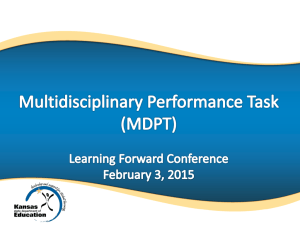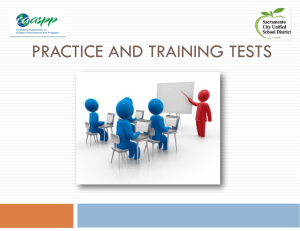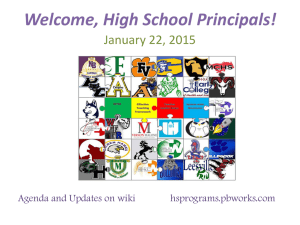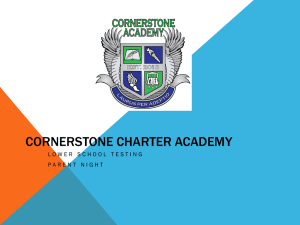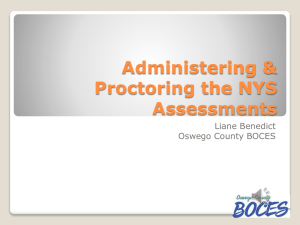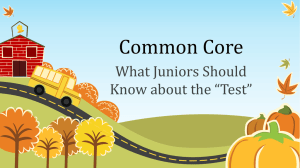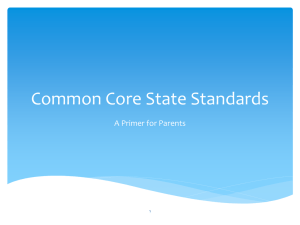Assessments in USD 457
advertisement
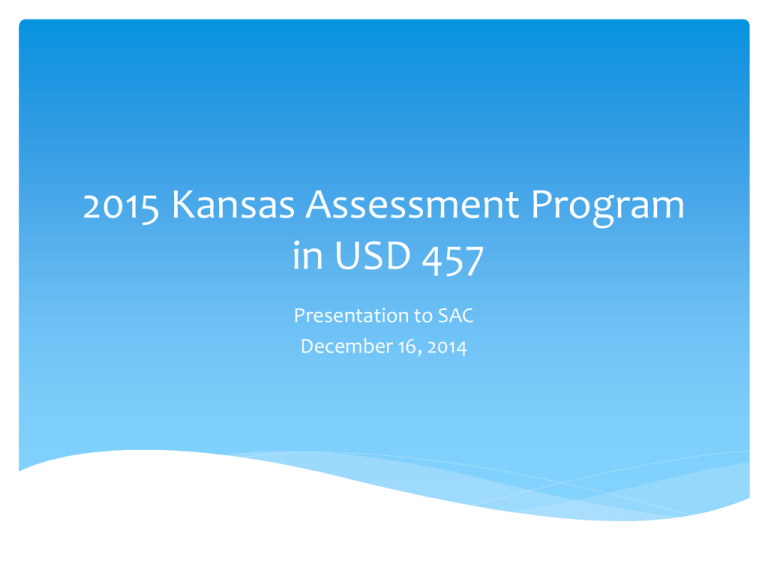
2015 Kansas Assessment Program in USD 457 Presentation to SAC December 16, 2014 Instruction is Key We are on the right track Do not let assessment preparation derail implementation of KCCRS (CCSS), MTSS and our curriculum Keep the focus on quality instruction Assessments for 2015 Mathematics – will add performance task English Language Arts Science – not fully converted to new standards History/Government – will add performance in future Multidisciplinary Performance Task – more on this later DLM KELPA-P cPass Changes for 2015 High school test for math and ELA moves to 10th grade Multidisciplinary Performance Task (MDPT) Performance Task in math Performance Task in history/government will be MDPT, even if prompts are science Assessment Schedule Math Math Perform ELA MDPT Grade 3 x x x Science or H/G Grade 4 x x x Science or H/G Grade 5 x x x Science or H/G Grade 6 x x x Science or H/G Grade 7 x x x Science or H/G Grade 8 x x x Science or H/G Grade 10 x Grade 11 History/Govt Science x x x x x Similar to MDPT x Testing Window Math, ELA, Science, MDPT, History/Government March 9 to May 8 District deadline is 1 week before the hard close date of May 15 DLM November 10 to December 20 January 5 to March 16 March 16 to May 15 KEPLA-P February 3 to May 1 cPass October 1 to May 15 “Need Not Test” Date Math, ELA, Science, History/Government, MDPT Students entering on or after March 7 need not test DLM Students entering on or after December 31 need not test KELPA-P All students must test, regardless of entry date Newcomers Exceptions Math, Science No exemption; arrival after March 9, 2014 (last school year) counts for participation only ELA, History/Government Arrival after March 9, 2014 (last school year) need not take ELA or H/G; must take KELPA-P DLM Follows rules for content areas KELPA-P All ELL students must take Accommodations Accommodation forms must be completed for each student receiving an accommodation Forms should already be turned in All accommodations are entered by the Office of Instruction Again this year, there will be NO HUMAN READERS Quiet testing environment is not considered an accommodation All accommodations must be part of regular instruction and documented on a plan Headphones Headphones are required for all KELPA-P students Also needed for anyone with a read-aloud accommodation Next year, we are told that all students will need headphones May put earbuds or headphones on supply list Format Two tests: a general test and a DLM (Alternate) test KAMM has been retired Spanish paper copies available as accommodation for math and science Science assessment has only been partially aligned with new standards More Format Multiple choice Technology enhanced These two will be machine scored Performance tasks will be human scored More on scoring when the state informs us KEPLA-P is locally scored Multidisciplinary Performance Task This is the biggest change in assessments this year Students in grades 3-8 take one MDPT Prompts will be in either history/government or science MDPT counts as the performance task for history test for grades 6 and 8, even if the prompt is based on science High school history/government test will look like MDPT MPDT MDPT has two parts Part 1: Read texts, graphs, etc. and take notes Part 2: Use notes and texts to compose on-demand response to a prompt Each part takes about 50 minutes (untimed) Students will know up front if the writing should be narrative, informative, argument/opinion Getting on the same page What it IS: An on-demand performance task aligned to current Kansas standards A “snapshot” of a student’s critical thinking and writing in an on-demand environment For 2015, a field test What it is NOT: A week-long, process-based writing task like the old Kansas Writing Assessment The opportunity for students to demonstrate the full range of their writing abilities For 2015, an assessment that will “count” for accountability at the district or state level Definition of MDPT A performance task incorporating multiple disciplines which requires students to engage with texts, images, diagrams and other resources and then compose a narrative, informational/ explanatory text, or opinion (35)/argument (6-HS). The Standards ELA Writing HGSS Science Where is our common ground? The MDPT will seek to gain a score for two content areas: ELA and Science OR ELA and HGSS, depending on the year and grade. In some grades, there will only be an ELA score. ELA Standards Science Standards HGSS Standards 2015 Field Test What is a field test? The purpose of a field test is to determine whether items/prompts will produce valid and reliable information. Why is this necessary? We want to be confident in what a score on a particular assessment means, and in order to do that, the items need to be “tested” by students in real testing situations so that we can determine which items provide valid and reliable information and which do not. 2015 Field Test What does “field test” mean for the 2015 MDPT? • More prompts will be field tested than will be used in a single year. • For this year, Science texts and prompts will be field tested in 5th grade, even though this will be the final year or 4th graders to take the old Science assessment. • Grades that alternate between content area topics for the MDPT texts and prompts will field test prompts for different subject areas. A student could receive a Science prompt and texts, OR a prompt and texts from HGSS or ELA. Students will only take one, but subject areas won’t be assigned to a particular grade. So, what will it LOOK like? Activity 1: Students will have one session to read/interact with and take notes about 2-3 resources. The resources will be provided through KITE, but students will be able to take notes using paper/pencil. Students will also be given a set of guiding questions to help guide their thinking for planning, and to set them up for a successful composition session. So, what will it LOOK like? Activity 2: Students will be given a prompt in which they will be asked to write ONE of the following: Narrative Expository/Informational piece Opinion/Argumentative piece Students will also be provided a list of “reminders” aligned to the rubrics to help ensure they adhere to the scoring criteria. Other important information Each session is approximately 30-50 minutes, but both are untimed, and students needing more time should be granted more time. Students will be able to use their notes from Activity 1 to inform their writing during Activity 2. Students will have access to the resources in KITE during both activities. Other important information Most Multidisciplinary Performance Tasks will include: Stimuli A combination (approximately 2-3) of short, related texts Grades 3-5: about 750 words total Grades 6-8: about 1000 words total At least one graphic (e.g., chart, map, timeline, story arc) Note: Some tasks vary slightly from the information above. For example, most HGSS-related tasks will not include a graphic. Guiding questions Students are not required to answer the guiding questions, and they will not be scored. Prompt What should a completed MDPT look like? It should… It likely won’t… follow the prompt and attempt to adhere to the descriptors in levels 3 and 4 on the MDPT rubrics. be approximately 1-3 paragraphs for grades 3-5, and approximately 3-5 paragraphs for grades 6-12. It is okay for students to exceed these guidelines. be able to be completed in a single sitting (the composition portion). look like a polished piece of writing. be comparable to longer pieces of writing completed during processbased, multi-day assignments. take the student several hours to complete. Scoring MDPT Scoring process still unknown Not intended to be a polished piece of writing Rubrics similar to 6-Trait being developed Ultimately, scores may be used for different academic areas MDPT Rubrics Student work will be scored holistically. There are four performance categories on all rubrics. All grade bands have rubrics for: Opinion/Argument Informative/Expository Narrative Note: This is another way we can open up the curriculum…by not assigning a particular type of text to a particular grade. How can I prepare my students? Do: Focus on Instruction. Organize instruction around the standards and best practices. Continue to teach the writing process. Don’t: Focus writing curriculum around practicing for the MDPT. Organize curriculum around the MDPT requirements. Format all writing assignments to be on-demand assignments. Assessments at HS Level Wilted Bouquet US Dept. of Ed rejected Kansas request for multiple tests at high school level Also rejected request for testing at 9th grade Assessments at HS Level New plan calls for testing at grade 10, then having students take proficiency tests for career pathway or for industry certification. Ethics Training Required of all staff involved in testing No one helps with the assessments who has not been through training Training done by ESC staff Most training on January 30 Sign off required before testing Reminder – Instruction is Key We are on the right track Do not let assessment preparation derail implementation of KCCRS (CCSS), MTSS and our curriculum Keep the focus on instruction
